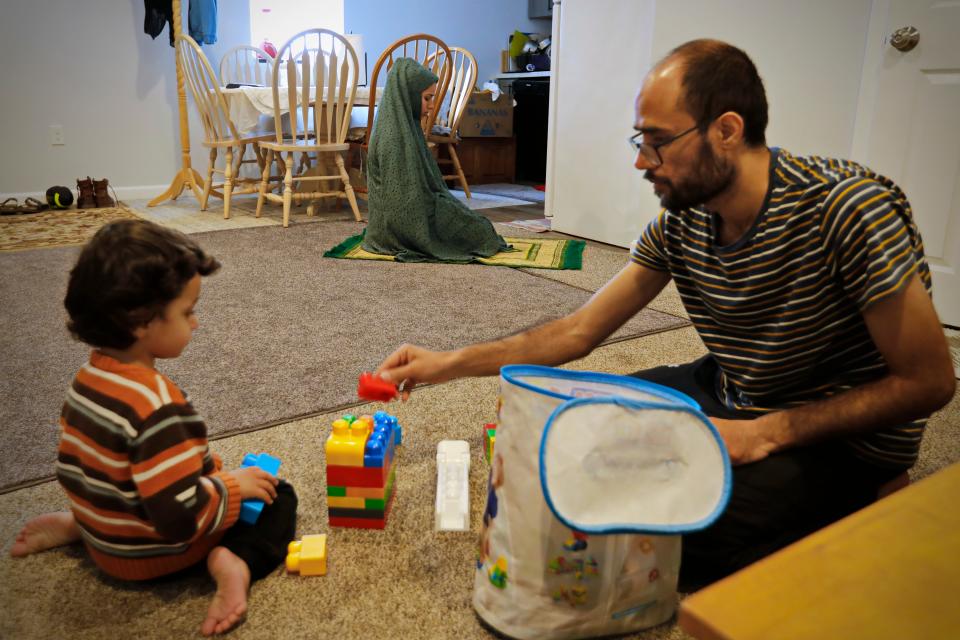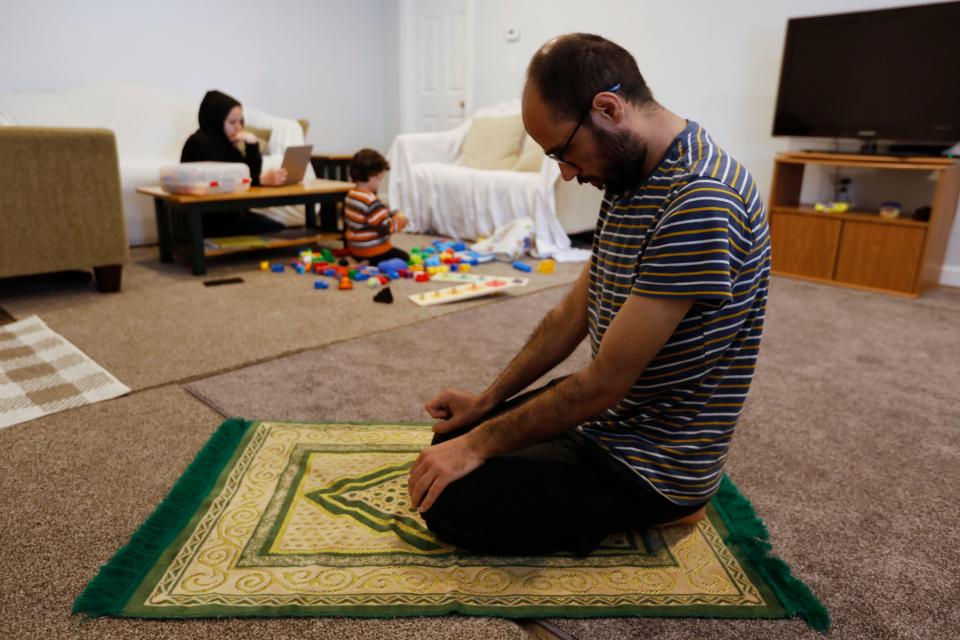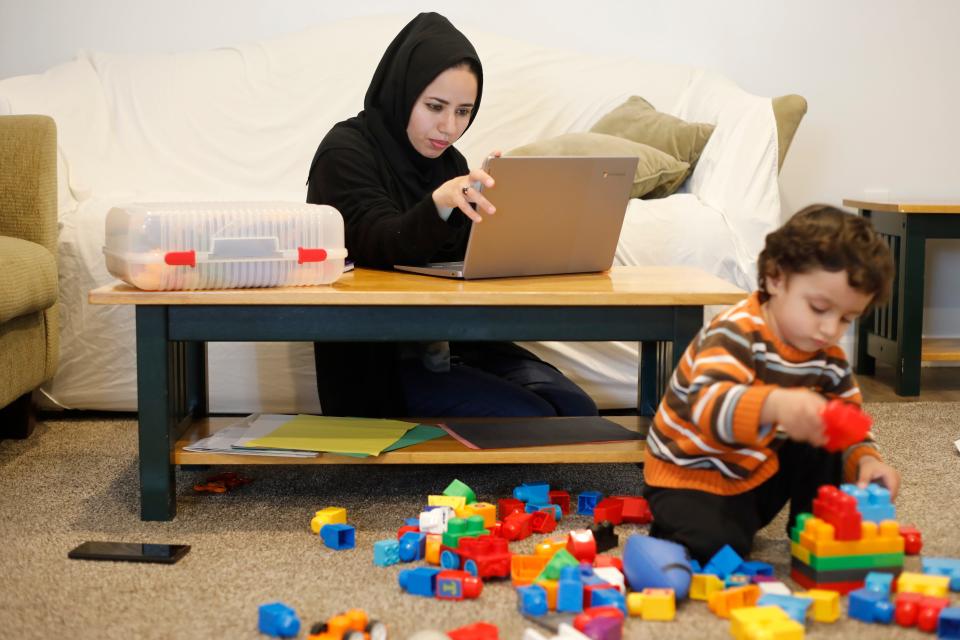This Afghan family had to flee their country. This was their first Ramadan in their new home.
NEW BEDFORD — Khalid Omar unfurled a green prayer rug in his living room Wednesday afternoon, revealing a gold pattern on its top. He laid it down, positioned it to face Mecca — the site of the holiest shrine in Islam — and began his Maghrib prayers; the fourth of the five daily required of Muslims.
Ferdous Omar, 2, spurts about the home, iPad in hand as an episode of Talking Tom and Friends plays on the television.
In short order, his mother, Khalida Hakimi, corralled him in an embrace, showering him with kisses and loving words in Dari, one of the major languages spoken in Afghanistan.
After an accident where the child burned his hand on a cup of tea a few months ago, the couple prays in turns when at home out of an abundance of caution.
But when they are having their moments with God, nothing else matters. Especially during the holy month of Ramadan.
"Once you start [praying] you don't hear anything," Omar, 30, said. "You just focus."
This Ramadan is different though. It's the first in their new home in the U.S. as well as their first in a non-Muslim majority country.
Most prominently, it's their first after they were evacuated from Afghanistan as Kabul fell to the Taliban in August 2021.

Afghan refugees fled country in 1990s
Refugee life is not new for the family. During Afghanistan's civil war in the 1990s, they each fled to Pakistan with their respective parents.
There they spent much of their childhoods.
"I've been a refugee more than I've been a citizen of my own country," Omar said. "When I was born, my family emigrated from Afghanistan to Pakistan because of the civil war."
Home equity theft?: How this New Bedford retiree lost her house over $10,000 in tax debt
Omar grew up in Quetta — capital of Pakistan's restive Balochistan province — where he met Hakimi, 29, when they were about six and seven years old respectively. They became quick friends, but that time together was cut short when her family returned to Afghanistan in 1997, shortly after the Taliban first came to power.
"Probably because they thought the Taliban will govern Afghanistan forever and, eventually, we would all have to go back," Omar said.
Hakimi was in Herat in 2001 when the U.S. invaded and swiftly routed Taliban regular forces. She recalled that during the invasion, she and her seven siblings saw planes performing bombing runs from their rooftop.

"When they were attacking in the night it was so scary," Hakimi said. "So, we all wanted to sleep with our dad...so we would not scare at night.
"We all were sleeping beside my dad...We were just holding [his] legs."
Real estate report:Gorgeous Little Compton waterfront estate sells for $3.8 million
Those moments of terror eventually gave way to the rise of the Republic of Afghanistan under the leadership of Hamid Karzai. It was under that government that the childhood friends reunited.
Taliban enters Kabul
Omar returned to Afghanistan in 2009, when he was 18 and Hakimi was 17. They reconnected in short order.
"I told my mom: keep an eye on her," he recalled. "Make sure nobody takes her."
They married in 2017.

By August 2021, both were professionals. Hakimi, a doctor, was finishing up her OBGYN specialty studies while Omar worked on a women's empowerment project with the United States Agency for International Development.
Because of these circumstances, they felt compelled to flee as the Taliban entered Kabul.
"We left Afghanistan ten days after the government fell," Omar said. "They came on the 15th and we left [for] the airport on the 25th."
The family — with only a bag a piece, their documents, and some food — spent two sleepless nights in the airport as chaos materialized around them.
"Those were really tough days," Omar said. "But luckily, we made it."
'A big void in the world': Eric Pope remembered for service to New Bedford
The family first went to a refugee camp in Qatar, then Germany, before coming to the U.S. — El Paso, Texas, specifically — in November.
They then briefly moved in with a host family in Andover before being placed in their new home by St. Luke's Hospital in New Bedford — near to Omar's brother and sister-in-law.
Trauma after fleeing Afghanistan
After an exchange of parting pleasantries, a woman with an ID badge leaves the Omar home, allowing space for their next guest to come in.
Omar and Hakimi explained that she was an early intervention specialist working with Ferdous, part of an effort to mitigate the traumatic effects of the months since the evacuation jolted him out of a comfortable middle class existence.
"I think it has affected him a lot," Omar said. "We could understand the situation, like what we are going through, and we could handle it. But for babies, it was very tough."
Indeed, Ferdous was eating solid foods when the family evacuated. That changed when they were moved from their initial camp in Qatar to Germany.
"In the camps there was no solid food for him, just milk," said Hakimi. "So he just forgot [how] to eat solid food.
"He still is not eating," she continued, wiping away a tear as it formed in her eye. "And now I'm trying to just feed him again. But he refuses. He just drinks milk."
The trauma touched Khalid as well. While still in the camps, doctors prescribed a medication for his depression and diagnosed him with post-traumatic stress disorder.
The ordeal has affected him physically as well. Omar lost 22 pounds over the course of the ordeal, bringing him down to about 130 lbs.
"In camps, it was really tough days," Omar said. "If you put me [through that] again, I will not be able to handle it.
"When you are in that situation, that bad situation, it's survival mode," he continued. "Automatically [in] your mind, everything changes."
Afghan evacuees in Bristol County
The family arrived in New Bedford in February at the behest of Omar's brother, Shafiullah Amini, and his wife, Farkahnda Ehssan.
The Omars' arrival brought the number of Afghan evacuees in Bristol County to 28, according to the SouthCoast Afghan Welcome Network. Of the six families, five settled in New Bedford and one in Dartmouth.
Though evacuee may seem like an odd term, there are reasons for it, according to Mali Lim, an immigration attorney.
'The New Bedford we aspire to build': What Mayor Mitchell said about the state of the city
"Everybody just says [refugee] because I think everybody understands the word, for better or for worse," Lim said. "There’s all kind of connotations."
According to Lim, many of the arrivals in Massachusetts were evacuated by the Department of Defense and fall into two categories.

The first of these are Special Immigrant Visas, slated for those who worked directly with the U.S. government and military in Afghanistan.
The Omars currently have a SIV's, but initially entered the U.S. under the second category, as humanitarian parolees.
"When the [Afghan] government turned down everything was chaos," he said. "So they were just evacuating everyone and everyone that entered the U.S. came under humanitarian parole."
Though the Omars are lucky — they recently applied for green cards — many remain in limbo, as the humanitarian parole term applies to a wider category of people.
"Humanitarian parole was granted to a lot of people who didn’t work directly for the U.S. Military but they were people that the government deemed particularly vulnerable," Lim said. "People that maybe worked for Afghan National Security Agency, journalists, women’s rights activists."
'We have not heard any bomb blasts'
It's a Saturday evening during Ramadan and 100 people gathered at the Islamic Society of Southeastern Massachusetts in Dartmouth to break their daily fast with a communal iftar.
In the common room, people gather and prepare the table filled with dishes of rice, chicken and dal.

Ferdous and other children run laughing amongst the celebrants, adding to the symphony of community reverberating within the mosque's walls.
In another corner, men gather around Amjad Bashlah, an immigrant from Syria, who holds a container of dates that they will use to break their fast at 7:34 p.m.
"Hold on guys! It's not time yet!" he said sternly.
About a minute later, Martin Bentz stepped up to the mic at the front of the room to recite the Adhan — the call to prayer.
"Allahu akbar! Allahu akbar!" God is great! he sings out. "Ashhadu an la ilaha illa Allah." I bear witness that there is no god except the One God.
In the first row of worshippers stands Khalid Omar. It's his first visit to the mosque with his family since they came to the area.
The experience emphasized for them the month's focus on community, and the blessings it has brought to their lives.
"They have helped us a lot," Omar said in the interview later at his home. "Everything you see around, the community brought us because we didn't have any money to buy."
Slowly but surely, the family is integrating into life in their new home. The International Institute of New England currently pays their rent and utilities. In addition, they provide the family with a $500 stipend — a stop-gap measure for six months to help them land on their feet.
They said they cannot perform zakat — traditional alms for the poor — this Ramadan, but plan to once on their feet.
Omar has had several job interviews recently and said he hopes to be employed in the near future.
Hakimi began work in April as a medical interpreter for IINE.
When she can find a moment, she also researches how to transfer her medical certifications to the U.S. in order to become a practicing physician.
The quiet of their new home only makes their first American Ramadan more important.
"It's peaceful," Omar said, when asked what Ramadan meant to him.
"We have not heard any bomb blasts for a long time now."
Contact Kevin G. Andrade at kandrade@s-t.com and follow him on Twitter: @KevinGAndrade. Support local journalism and subscribe to the Standard-Times today!
This article originally appeared on Standard-Times: Afghan refugees in New Bedford experience Ramadan at Dartmouth mosque

